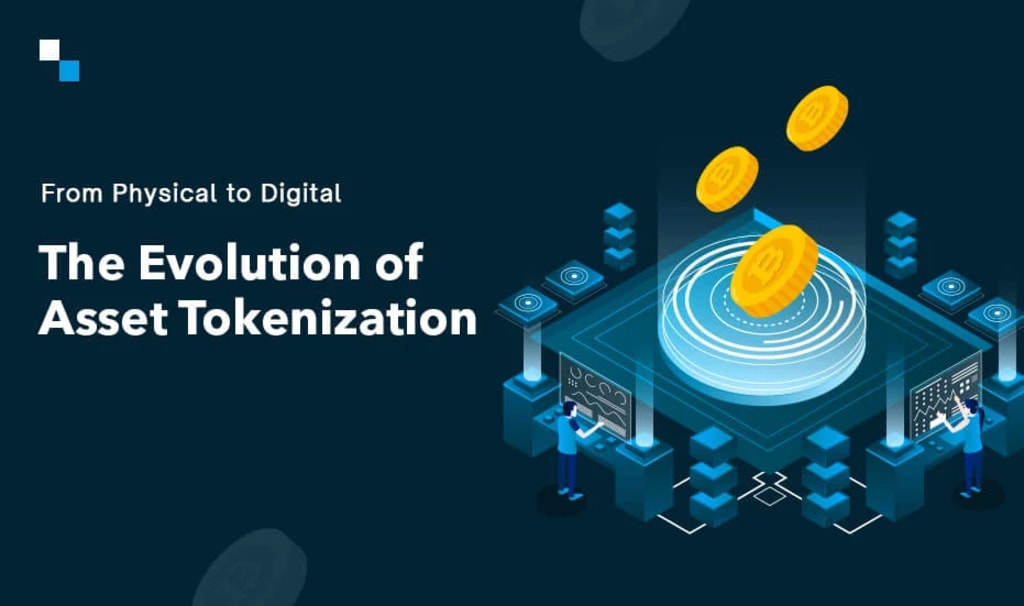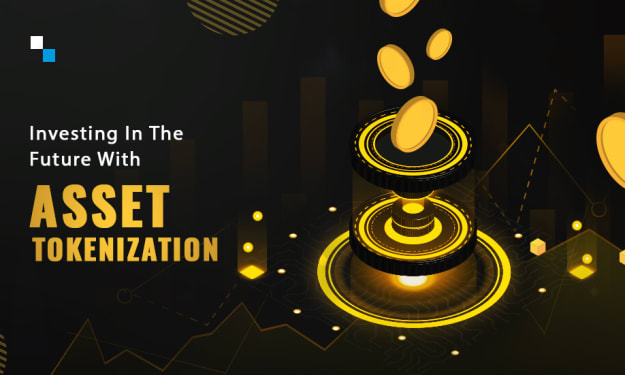Revolutionizing Investing: The Transformative Impact of Asset Tokenization in Modern Times
Asset tokenization

With the emergence of asset tokenization, there has been a significant shift in the world of investing. This revolutionary concept has the potential to reshape the way assets are bought, sold, and owned. By leveraging blockchain technology, digital asset tokenization enables the conversion of real-world assets into digital tokens, allowing for fractional ownership and seamless transferability. In this blog, we explore the transformative impact of asset tokenization on modern investing and its potential to revolutionize financial markets.
Understanding Asset Tokenization
Asset tokenization is the process of creating digital representations of real-world assets, such as real estate, art, commodities, and more, on a blockchain network. These digital tokens are backed by tangible assets, and their value is directly linked to the underlying asset’s value. Each token represents a specific portion or share of the asset, making it divisible into smaller units. This fractional ownership allows investors to access markets that were previously out of reach due to high entry barriers.
Why Asset Tokenization Has Been Gaining Traction?
Asset tokenization has garnered huge popularity due to its many benefits. Some of the reasons of increased traction are:
Enhanced Liquidity
One of the primary benefits of asset tokenization services is enhanced liquidity. Traditional real estate, for example, is often considered illiquid, meaning it cannot be easily converted into cash. However, by tokenizing real estate assets, investors can buy and sell tokens representing fractional ownership with ease on digital asset exchanges. This newfound liquidity not only benefits investors seeking to exit their positions but also enables a broader pool of potential buyers and sellers.
Furthermore, the liquidity factor plays a crucial role in attracting investors to the tokenization space. Historically, investing in certain assets required a long-term commitment and limited the ability to react quickly to market changes. With asset tokenization, investors gain the flexibility to liquidate their positions or diversify their portfolios more efficiently, responding to market dynamics in real-time.
Financial Inclusion and Accessibility
Asset tokenization opens up a world of opportunities for financial inclusion. Investors from various economic backgrounds can now participate in markets that were previously reserved for high-net-worth individuals or institutions. The ability to purchase fractional tokens makes it possible for individuals to invest in assets that align with their financial goals, regardless of their available capital.
The newfound accessibility to investment opportunities in Asset Tokenization Platform Development is not only limited to investors but also extends to asset owners. Tokenization allows asset owners to unlock the value of their illiquid assets by fragmenting them into smaller, tradable units. This democratization of ownership paves the way for increased participation from a diverse pool of investors, fostering a more inclusive and equitable financial ecosystem.
Transparency and Security
Blockchain technology, the backbone of asset tokenization, offers unparalleled transparency and security. Each transaction is recorded on an immutable and decentralized ledger, ensuring an accurate and transparent ownership history. The elimination of intermediaries and reliance on smart contracts further reduces the risk of fraud and provides a high level of security for all participants.
The transparency aspect of digital asset tokenization builds trust and confidence among investors. Token holders can easily access real-time information about the asset’s performance, including market value, rental income, or dividends. Moreover, the transparency ensures that all parties involved in the investment process have access to the same data, mitigating information asymmetry and promoting fair and informed decision-making.
In terms of security, blockchain’s decentralized nature makes it resistant to single points of failure and cyber-attacks. The smart contracts used in tokenization platforms are self-executing and immutable, meaning once they are deployed on the blockchain, they cannot be altered or tampered with. This robust security framework provides investors with peace of mind, knowing that their assets and investment records are safeguarded from potential threats.
Global Accessibility and Market Efficiency
The tokenization of assets transcends geographical boundaries, enabling investors from around the world to access various markets. This global accessibility can lead to increased market efficiency as investors are no longer limited to local opportunities. The decentralized nature of blockchain technology allows for the seamless transfer of ownership and funds across borders, eliminating the need for intermediaries and reducing transaction costs and processing times.
The enhanced market efficiency arising from asset tokenization is particularly evident in real estate markets. Traditionally, real estate transactions involved time-consuming paperwork, intermediaries, and extensive due diligence. With tokenization, property ownership can be recorded and transferred on the blockchain, streamlining the entire process and reducing administrative overhead. Additionally, the fractional ownership of properties opens up new investment avenues, attracting a larger pool of potential buyers and reducing the time it takes to find suitable investors.
Real-World Applications of Asset Tokenization
The applications of digital asset tokenization are vast and continually expanding. Some of the real-world applications of asset tokenization are:
Real estate: Asset tokenization can be used to tokenize real estate assets. This can make it easier for investors to buy and sell real estate, and it can also increase the liquidity of real estate markets.
Private equity: Asset tokenization can be used to tokenize private equity assets. This can make it easier for investors to access private equity markets, and it can also increase the liquidity of private equity markets.
Art: Asset tokenization can be used to tokenize art assets. This can make it easier for investors to buy and sell art, and it can also increase the liquidity of art markets.
Intellectual property: Asset tokenization can be used to tokenize intellectual property assets. This can make it easier for investors to buy and sell intellectual property, and it can also increase the liquidity of intellectual property markets.
Crowdfunding: Asset tokenization can be used to facilitate crowdfunding campaigns. This can make it easier for businesses to raise money, and it can also give investors more control over the assets they invest in.
Regulatory Challenges and Compliance
Regulatory challenges in asset tokenization revolve around compliance, investor protection, and jurisdictional differences. To overcome these hurdles, stakeholders must engage with regulatory authorities to establish clear guidelines and frameworks for tokenized assets. Education and collaboration among industry participants and regulators are essential to foster a better understanding of the technology and its benefits. Developing standardized compliance procedures, conducting thorough due diligence, and implementing Know Your Customer (KYC) and Anti-Money Laundering (AML) measures can enhance transparency and build trust. By proactively addressing regulatory concerns, asset tokenization can gain wider acceptance and unlock its potential as a transformative financial tool.
Conclusion
Digital asset tokenization is undeniably revolutionizing investing in modern times. By bringing liquidity, accessibility, transparency, and security to previously illiquid and exclusive markets, this transformative concept opens up new frontiers for investors worldwide. As blockchain technology matures and regulatory frameworks evolve, asset tokenization is poised to reshape the financial landscape and democratize investing for generations to come. Investors, entrepreneurs, and financial institutions alike must adapt to this paradigm shift to fully capitalize on the transformative impact of asset tokenization in the modern era.
Looking forward to venture into the world of asset tokenization? Rely on Antier, the world-renowned company with expertise and experience in the domain. Get in touch today!
Original Source: https://www.antiersolutions.com/revolutionizing-investing-the-transformative-impact-of-asset-tokenization-in-modern-times/
About the Creator
Asset Tokenization services
Antier's asset tokenization services allow you to convert your traditional assets into digital tokens, which can then be traded on blockchain-based platforms.






Comments
There are no comments for this story
Be the first to respond and start the conversation.